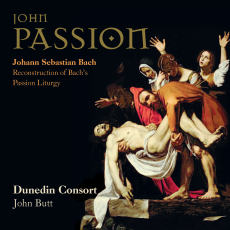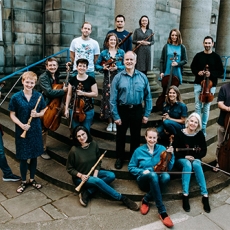John Passion - Dunedin Consort - Classical. net
This timely recording of the Bach John Passion has created quite a stir. It has already been awarded 'Record of the Month' etc by a variety of prestigious publications, for instance. Well-respected John Butt (also a distinguished author and Bach scholar) with soloists and the Dunedin Consort have drawn this positive attention for two reasons: the high quality of their performance; and the inclusion of music by Buxtehude, Schein and late Renaissance Slovenian composer, Jacob Handl (1550-1591) in their reconstruction.
Indeed, the CD is described as the 'Johannes-Passion sung within a Reconstruction of Bach's Passion Liturgy'. Of course the exact sequence of works performed for Good Friday Vespers in 1724, Bach's first year as Cantor of the Thomasschule at Leipzig, cannot be known. Yet the musical context is plain. It was only two years since the new (to the parishioners of Leipzig, at least) format 'Oratorio Passion' had been introduced to two of the churches there for which Bach had responsibility. In the Oratorio Passion, arias, choruses and chorales were added to the basic Passion sequence. The ever-progressive Leipzig Neue Kirche, it's to be noted, had made analogous changes some five years before. Add to this the failure of the Leipzig Opera and it was probably the case that there was already an appetite for such vocally-rich forms.
We also know that the Passion was planned to fit either side of the sermon delivered as the high-point of the event - between tracks 25 and 26 of CD 1, in fact. It's appropriate, then, that (various high-quality) audio files of a reading of a sermon by Erdmann Neumeister ('Epistolische Nachlese', 1720 - on 2 Timothy, 1, 10) and an 'Intercession' can be downloaded from, and/or listened to at, the Linn Records website. Where indeed is much other supporting material, text, (a link to) the Vopelius 1682 full score, a bibliography and so on - in typical comprehensive Linn fashion.
The librettist for the John Passion is unknown. The text has impact, and focus - especially on Christ's regal status. That's the tone of the John Passion. It gave Bach scope for a great variety of emotional outpouring as well as steady (though never staid: the reason, perhaps, why the John has been adversely compared with the Matthew Passion) exposition. And exposition which we know all the while is from the Evangelist, who's well-placed to provide us with his commentary. The playing of the Dunedin Consort is full of expression and of interpretative depth. Warmth and confidence. It's also very light of touch. Appropriately so. Listen to the aria, 'Ich folge dir' [CD.1 tr 16]. Strings delicately plucked; woodwind gently blown. Yet none of the force or impact of Bach's highly colorful, poignant or profound writing is lost.
Indeed, the thinner textures and smaller scale (than usual for some listeners) of the music's projection only adds to its immediacy and intimacy. Since every word of the singers is clearly yet passionately articulated and every phrase of the instruments effective, in fact, our relationship with Bach's purpose - both in what he provided for the original Leipzig congregations, and for eternity - is a more direct and intense one.
The descending chromaticism, the pathos, the sorrow and inevitably sour consequences of the denial recitative, 'Er leugnete' [CD.1 tr.21], hardly need swelling forces or insistent mounds of sound. So they don't get them here. Yet when - in the very next aria - 'Ach, mein Sinn' - excitement and tension are required to underline Petrus' doubt, they're there. They don't need summoning. It's also at such moments, the hiatuses after a climacteric in the Passion story, that the insertion of the (congregational) chorales and sermon is really effective... [CD.1 tr.s 24, 25, 26]. There's even a longer-than-usual pause on the CD for this.
This approach of John Butt's emphasizes the substance, the text, the import of the Passion story as it would have been received and understood almost 300 years ago by Bach's contemporaries. In fact, once the 'story' is propelled forward further - from 'Da fuhreten sie' [CD.1. tr.28], the color, dedication and regret are as brimming with clamor and pain without being either fulsome or clamorous. Contrast has made for real impact.
Despite the (opportunity to) place the 'added' music within the structure of the Passion, its first part actually ends towards the end of the first CD. The second begins with the 'Und die Kriegsknecht...' recitative at the point of the crown of thorns. The pace of the Passion story, however, is not lost and the several choruses that add such vim to this part of the Passion and in some ways push up the tension are a delight and a real uplift. The tempo stays brisk; so buoyant, in fact, that the aria with choir 'Eilt, Ihr angefochtnen Seelen' [CD.2. tr.16] seems almost to be over before it's begun.
This is not rushing; nor undue haste. The rhythm is effective in the extreme. And it's 'uphill all the way' from there to the close, which has the extra delight of Handl's motet, Ecce quomodo moritur iustus [CD.2 tr.37]. Despite being written 150 or so years earlier, it sits well in the reconstruction. As do the chorales that continue to be heard bursting through the solo progress of the Passion. Listen to the precision of such choruses as 'Lasset uns' [CD.2. tr.22] to hear deft, expressive, unhurried, yet vigorous singing from a choir able to make the most of this lovely music. As this portion of the work reaches its climax, you realize that Butt has in fact had the structural vision completely under control all along. Not so long as the Matthew Passion, the John is nevertheless substantial, of course; and the construction and maintenance of such architectural integrity is not easy. Especially with the added works by Buxtehude, Schein and Handl. Yet he does it - and the impact is formidable.
There is a consistency of tension and grace as this John Passion proceeds. Its poignancy is never downplayed. But neither is it exaggerated: clear and committed vocal diction and a delivery pregnant with awareness of the meaning are all we need to be taken into the music, and into Bach's confidence, so to speak. We need no other persuading. So it is that the extreme emotion of arias like 'Es ist vollbracht' [CD.2. tr.26] at Christ's moment of death make the impact they do... they're not having to compete with a previously overblown sense of climacteric. This also makes the moment afterwards ('Und neiget', 'Mein teuer Heiland') all the more affecting. A little goes a long way. This is the essence of Butt's conception of the John Passion. Its quiet wisdom successfully informs the performance from first note to last.
And it's the last notes of the music that make one of the most striking impressions: if you were unconvinced before of the worth, beauty or satisfactoriness of the impact that is made by this reconstruction, then the lovely final Congregational Chorale, 'Nun danket' will surely convince you. Its simplicity and melodic power will stay with you long after the CD has been put away. You may well think of worshippers from Bach's time stepping out - much moved - into the still raw Spring late afternoon and dispersing through the streets of Leipzig. It's more than such a speculative atmosphere that Butt has recreated. It's a statement whose very simplicity serves to re-introduce all the grandeur and splendor of Bach's achievement in the John Passion.
If there is a small caveat to this recording it is this: for some, the distinctive timbre of the Evangelist's tenor voice, Nicholas Mulroy, might be just too... 'fruity'; although it sounds too nasal, it's just as distinct. It adds a color that some may find off-putting. His enunciation and involvement in the text, though, are as superb and convincing as the techniques of every other soloist, the instrumentalists - and indeed the chorus throughout.

